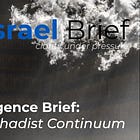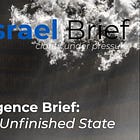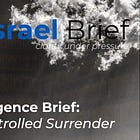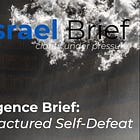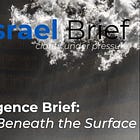About Israel Brief
Israel Brief delivers field-intelligence reporting for readers who still believe reality matters — and that euphemism is how democracies lose.
We went looking for a daily brief that treated Israel like a sovereign state at war — not a problem to be managed through process language and moral fog.
We didn’t find one. So we built it.
What began as a few lines shared privately became a publication read by engaged subscribers in Israel, the United States, the UK, and beyond — including policymakers, analysts, clergy, journalists, and serious readers who understand that clarity is a form of security.
We track facts, incentives, pressure points, and consequences — not vibes.
Mission
To provide intelligence-grade clarity on Israel, the Jewish people, and the West — especially where official narratives, media framing, and institutional language obscure reality rather than explain it.
We do not aim for performative neutrality.
We aim for accuracy, coherence, and consequence.
How Israel Brief Works
Israel Brief is a layered publication. Each product serves a different analytical function.
The Daily Brief
Frequency: Daily, Sunday–Thursday
Access: Paid access (Thursdays fully open)
The core product.
Each edition delivers:
The Flash Brief: ninety seconds on what matters today
The War Today: operations, deterrence, active threats
Inside Israel: law, politics, cohesion, governance capacity
Israel and the World: diplomacy, alliances, lawfare, pressure
Briefly Noted: what matters, fast
Developments to Watch: early-warning indicators
This is not a recap. It is a live field brief answering three questions: What happened? Why does it matter? What comes next?
The Long Briefs
Frequency: Weekly, scheduled for Friday morning
Access: Paid access.
Doctrinal and structural deep dives on questions daily coverage cannot resolve — sovereignty, deterrence doctrine, judicial power, civil-military strain, lawfare, and the long-arc forces shaping Israel and the West. Written as evergreen reference documents, not reactions.
Recent editions:
The Advocate’s Brief
Frequency: Weekly, on Tuesday
Access: Paid access.
A tactical brief for readers who speak publicly, lead communities, or engage institutions. Each edition maps live pressure, names the claims circulating this week, provides language that holds under hostile questioning, and identifies the rhetorical traps to avoid. Defensive clarity for real-world use.
The Strategic Assessment
Frequency: Monthly, on the First Wednesday of the month
Access: Free to all readers.
A forward-looking judgment document pulling the month’s signals to strategic altitude. Tracks what hardened, what slipped, and what pressure is forming next — across Israel, the region, and the wider system.
Publication Schedule
Israel Brief does not publish on Shabbat nor do we publish on Fridays in preparation for it.
Publication is also paused on Jewish holidays and designated observance days.
Long Brief editions are ordinarily scheduled for Friday morning so readers may read over Shabbat. If Friday is a Jewish holiday, the Long Brief releases on the nearest preceding permitted publication day.
If a regularly scheduled edition falls on a non-publication date, it releases on the nearest preceding permitted publication day.
Israel Brief does not issue substitute or make-up daily editions following observance days.
Editorial voice
Facts first. Adjectives last.
We read across the spectrum and refuse to flatten truth into “both sides.”
We call Hamas what it is. We say Judea and Samaria. We treat hostile narratives as instruments of pressure, not moral authority.
Facts have borders.
Memory is strength.
Clarity is duty.
Contact
General: [email protected]
Secure: Signal: @Uri.30 · Proton: [email protected]



